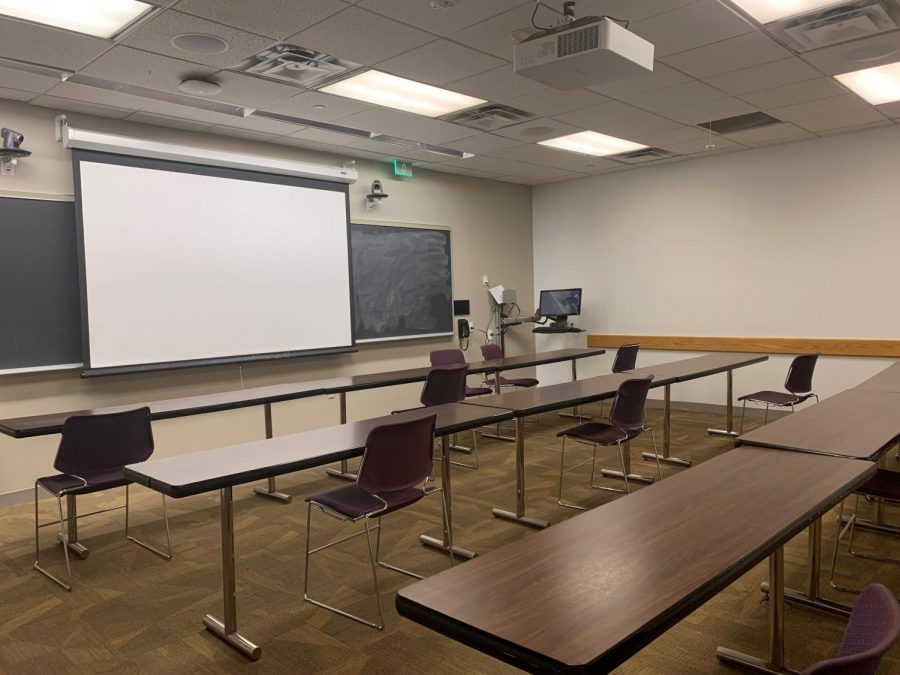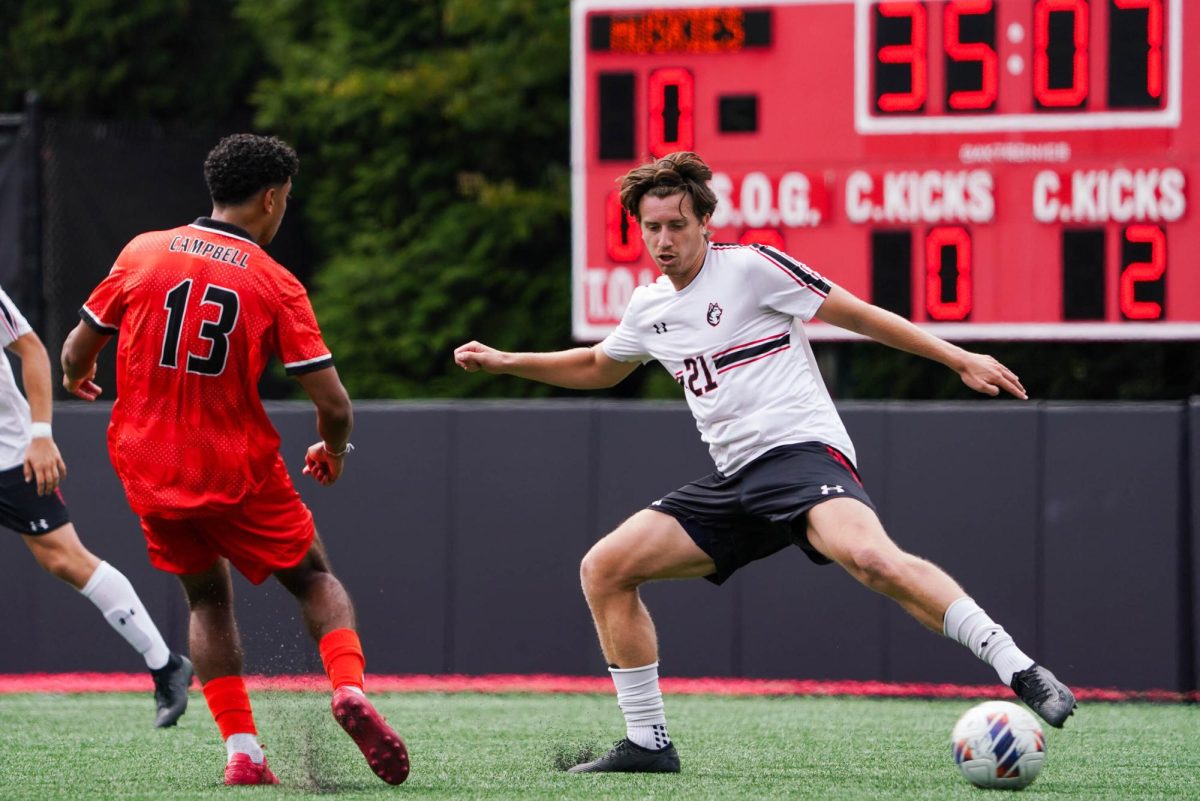Northeastern releases statement in opposition of unanimous SGA pass/fail resolution
The Student Government Association, or SGA, calls on university administrators to implement a “universal opt-in pass/fail policy” with a student designation deadline of Dec. 9.
December 8, 2020
Northeastern administrators took nearly three weeks to respond to a Nov. 2 Student Government Association resolution asking them to extend and expand the university’s pass/fail policy. Student leaders said administrators told them privately for weeks afterward that they would offer neither action nor public comment on the issue.
In the unanimous Senate resolution, the Student Government Association, or SGA, calls on university administrators to implement a “universal opt-in pass/fail policy” with a student designation deadline of Dec. 9. Its authors cite concerns about internet access, changes to course structure, difficulties for students with disabilities, time-zone-related issues and mental health.
Northeastern spokesperson Shannon Nargi offered the university’s first public statement addressing the resolution in an email to The News on Dec. 7, more than a month after the Nov. 2 Senate vote.
“The fall semester, while challenging, proceeded according to plan with students and faculty working under the mutual understanding that courses would be graded,” Nargi wrote. “Grades are an integral part of how the university measures achievement. A pass/fail system would place our students at a disadvantage as they compete for job opportunities and admission to top graduate schools.”
Joshua Sisman, co-author of the Nov. 2 SGA resolution and communications director for Northeastern’s chapter of the Young Democratic Socialists of America, or YDSA, said he thinks administrators’ argument is “absolutely ridiculous.”
“The nature of the policy is that it’s opt-in,” Sisman said. “The students who absolutely need it have the ability to determine whether or not they think it’s worth it, knowing all the factors and all the potential consequences. They are the ones who can decide if they think it’s worth it, and the university should not be the one to deny them that right.”
Sisman noted that Northeastern’s undergraduate research and fellowships website posted an article March 25 telling students that “the people who make graduate school decisions are people living through this disruption, just like you, and taking one or two courses Pass/Fail, even in core courses, will not harm your chances of getting into graduate school, particularly if you have strong grades otherwise.” He also pointed out that many prestigious graduate and medical schools, including Harvard Medical School and the Massachusetts Institute of Technology, say they will accept pass/fail grades on 2020 transcripts for admissions purposes.
Sisman said he’s frustrated by the university’s stance particularly because he knows administrators are aware of student need. Nearly 2,000 people have signed an online petition in support of the resolution.
“There’s a huge toll that has on students, [when] all you’re doing is sitting in your room, taking classes, doing homework and going to sleep, waking up, doing the same thing every day with no actual real stimulation outside of a computer screen,” Sisman said. He said friends have come to him crying, telling him how much they could use pass/fail as an option.
Student leaders said they first learned of the university’s opposition to an expansion of the pass/fail policy on Nov. 23, after weeks of attempted follow-ups.
SGA President Kate Kuznetsova said Bob Jose, Northeastern’s dean for cultural and spiritual life and administrators’ liaison to SGA, told her in a private meeting that day that administrators saw this semester’s complications as different than those of last semester — when the university implemented a similar SGA resolution — because students knew what they were getting into this time.
“Because the faculty and students and staff went into the semester with the understanding that the grades are going to be valued normally, [administrators] would not be comfortable with changing it,” Kuznetsova said Jose relayed to her.
Rose Meus, a second-year history and international affairs major, said she’s frustrated by administrators’ reasoning because “it’s only gotten worse.” Boston saw an average of 850 new COVID-19 cases each day the week of Dec. 3, a seven-day average more than double last spring’s peak.
Meus said sometimes the on-campus internet cuts out in the middle of class and she’s so overwhelmed that she decides to go back to sleep. She also said her workload seemed like it “tripled” as professors tried to adapt to the new format. Her GPA dropped more than half a point since last semester, she said, and she’d welcome an opportunity to designate one or two of her classes for pass/fail grading.
Jordan Clark, a graduate student in Northeastern’s urban and regional policy program, said the online format has made participation difficult for him. He said this semester his computational statistics grade dropped 10 percentage points after he didn’t ask a professor a question for fear he’d misinterpret it online.
“I was always the kid growing up who got ‘talks too much in class,’ so participation was like the easy A for me,” Clark said. “Online though … it’s harder.”
Clark said he’s worried how recruiters might perceive even a small drop in his grades in the context of their prejudices. Clark is Black and has PTSD, and said employers in his field might not give him the benefit of the doubt because of it.
“If … I’m applying to a position, and they see a B-minus, instead of a B-plus or an A-minus, that could change whether they think I know what I’m talking about or not,” he said.
Clark said a pass/fail designation on his transcript would give him the opportunity to control the narrative and explain himself to recruiters.
“Look at the universities who [enact universal pass/fail policies] and why they do it. That’s because they have a track record systematically of caring about students’ well-being,” he said. “They understand that some people might ‘abuse’ it, but at the end of the day, it’s the environment that you’re creating that allows people the options to make choices and feel like they’re in control.”
The Nov. 2 SGA resolution lists several colleges that have implemented expanded or extended pass/fail policies this semester, including the Massachusetts Institute of Technology, Brandeis University, Tufts University, University of Massachusetts Amherst, Stanford University, University of Virginia, University of Michigan, University of North Carolina, University of Delaware, Ohio State University and George Washington University.
Jordan Buchman, chair of Northeastern’s YDSA chapter and a co-author of the resolution, said since YDSA leaders learned administrators opposed the resolution, they’ve had members putting up flyers around campus asking students to email their deans about the issue. A recent YDSA tweet asks students to call the direct number for the office of Provost David Madigan to push for action on pass/fail. YDSA also provided a script for students that do so.
While he was frustrated at the university’s response, Sisman said he’s hopeful about YDSA and SGA action in the future.
“We’re going to take what we’ve learned and make sure that the next time we fight on behalf of the students, that the university will not be able to ignore us no matter how hard they try, because we will hit them where it hurts the most,” Sisman said.
Editor’s note: news staff Adessa Jayne contributed to reporting on this piece.







